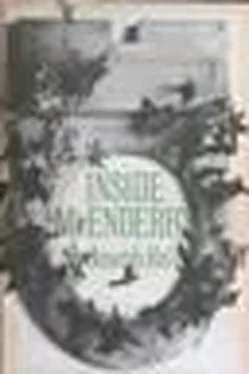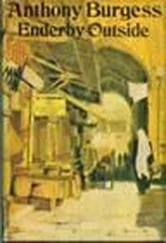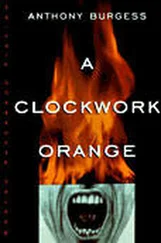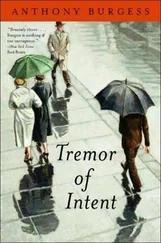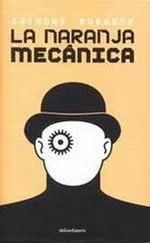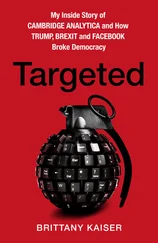"Now," said Vesta Bainbridge, and a rosy tongue-point darted out, picked up a toast-crumb, then darted in again. "I want you to know that I admire your work, and what I propose now is entirely my own idea. It's met with some opposition, mind you, because Fem is essentially a popular magazine. And your poetry, as you'll be proud to admit, is not exactly popular. It's not unpopular either, of course; it's just not known. Pop-singers are known and TV interviewers are known and disc-jockeys are known, but you're not known."
"What," asked Enderby, "are these things? Pop-singers and so on?" She looked askance at him and noticed that his bewilderment was genuine. "I'm afraid," said Enderby, "that since the war I've rather shut myself off from things."
"Don't you have a radio or a television set?" said Vesta Bainbridge, her green eyes wide. He shook his head. "Don't you read newspapers?"
"I used to read certain Sunday papers," said Enderby, "for the sake of the book reviews. But it made me so very depressed that I had to stop. The reviewers seemed so," he frowned, "so very big, if you see what I mean. They seemed to enclose us writers, so to speak. They seemed to know all about us, and we knew nothing about them. There was one very kind and very knowledgeable review of a volume of mine, I remember, by a man who, I suppose, is a very good man, but it was evident that he could have written my poems so much better if only he'd had the time. Those things make one feel very insignificant. Oh, I know one is insignificant, really, but you've got to ignore that if you're to get any work done at all. And so I've tended to cut myself off a bit, for the sake of the work. Everybody seems to be so clever, somehow, if you see what I mean."
"I do and I don't," said Vesta Bainbridge, smartly. So far she had eaten all the anchovy toast, five egg sandwiches, a couple of pikelets and one squelchy little pastry, and yet contrived to look ethereal, mountain-cool. Enderby, on the other hand, who, because of his heartburn, had only nibbled mouse-like at a square inch of damp bread and an egg-ring, was aware of himself as gross, sweating, halitotic, his viscera loaded like a nightsoil-collector's bucket. " I don't feel insignificant," said Vesta Bainbridge, and "I'm just nothing compared with you."
"But you don't have to feel insignificant, do you?" said Enderby. "I mean, you've only to look at yourself, haven't you?" He said this dispassionately, frowning.
"For a man," said Vesta Bainbridge, "who's cut himself from the world, you're not doing too badly. I should have thought," she said, pouring more tea, "that it was very unwise for a poet to do that. After all, you need images, themes, and so on, don't you? You've got to get those from the outside world."
"There are quite enough images," said Enderby, speaking with firm authority, "in half a pound of New Zealand cheddar. Or in the washing-up water. Or," he added, with even greater authority, "in a new toilet-roll."
"You poor man," said Vesta Bainbridge. "Is that how you live?"
"Everybody," said Enderby, with perhaps diminishing dogmatism, "uses toilet-paper." A man in spectacles, very tall and with an open mouth, looked across from his chair as if to dispute this assertion, thought better of it, then returned to his evening paper. Poet Refuses Medal, said a tiny headline which Enderby caught sight of. Some other bloody fool shooting his mouth off, some other toy trumpet singing to battle.
"Anyway," said Vesta Bainbridge, "I think it would be an excellent thing for you to have a wider audience. Would you try it for, say, six months, a poem every week? Preferably set in the form of prose, so as not to offend anyone."
"I thought people didn't actually find verse offensive," said Enderby. "I thought they just despised it."
"Be that as it may," said Vesta Bainbridge, "what do you say to the proposal?" She shattered a sort of macaroon with a fork and, before eating, said, "The poems would have to be, shall I say, and I hope this is the right word, ephemeral. You know, dealing with everyday things that the average woman would be interested in."
"The dross of the workaday world," said Enderby, "transmuted to sheerest gold. I suppose I could do that. I know all about household chores and dishcloths and so on. Also lavatory brushes."
"Dear me," said Vesta Bainbridge, "you have got a cloacal obsession, haven't you? No, not that sort of thing, and not too much of this sheerest gold, either. Womankind cannot bear very much reality. Love and dreams are wanted, also babies without cloacal obsessions. The mystery of the stars would come in quite nicely, especially if seen from the garden of a council-house. And marriage, perhaps."
"Tell me," said Enderby. "Are you Miss Cambridge or Mrs?"
"Bainbridge, not Cambridge. Fem, not Phlegm. Mrs. Why do you want to know?"
"I have to call you something," said Enderby, "don't I?" She seemed at last to have finished her meal, so Enderby offered his crumpled cigarette-packet.
"I'll smoke my own," she said, "if you don't mind." She took from her handbag a packet of ship's Woodbines and, before Enderby could find an unused match in his matchbox (he saved used matches, a long unfathomable habit), she had nicked her pearl-faced lighter on and then off. Her wide nostrils walrussed out two pretty blue jets.
"I take it," said Enderby, "that your husband's in the navy."
"My husband," she said, "is dead. It shows how cut off you are, really, doesn't it? Everybody else seems to have heard of Pete Bainbridge."
"I'm sorry," said Enderby. "Very sorry."
"What for? Because he's dead, or because you've never heard of him? Never mind," said Widow Bainbridge. "He died in a smash four years ago, in the Monte Carlo Rally. I thought everybody knew that. It was a great loss, the papers said, to the motor-racing world. He left behind a beautiful young widow, a bride of only two years," she said, her tone half-mocking.
"He did," said Enderby gravely. "He most certainly did. Beautiful, I mean. How much?"
"How much what? How much did he leave, or how much did I love him?" She seemed suddenly tired, perhaps from over-eating.
"How much do I get for doing these poems?"
"Mr Dick sets us all right," said Vesta Bainbridge, sighing and sitting up straighter. She brushed minimal crumbs off her lap and said, "Two guineas a poem. It's not much, but we can't manage more. We're featuring the memoirs of a pop-singer, you see-not very long memoirs, of course, because he's only nineteen-but those are costing us a pretty penny, believe me. And the memoirs have to be written for him as well. Still, the effect on the circulation should be, to say the least, stimulating. If that princely fee is all right by you I'll send you a contract. And some back numbers of Fem, to show you what it's like. Please remember that the vocabulary of our readers isn't very extensive, so don't go using words like 'oriflamme' or 'ineluctable'."
"Thank you," said Enderby. "I'm really most grateful that you should have thought of me like this. You're really being most kind." He had been poking into the ashtray with a matchstick, breaking up cigarette-ends; this had necessitated a sort of crouching on the chair's edge, his bald crown presented to Mrs Bainbridge. Now he looked up sincerely, his eyes rather wet behind their glasses. She smiled.
"Look," she said, "you don't believe me about my liking your poetry, do you? Well, I even know one or two of them by heart."
"Say one," begged Enderby. She took breath and recited, quite clearly but with few nuances of tone:
"A dream, yes, but for everyone the same.
The thought that wove it never dropped a stitch;
The Absolute was anybody's pitch
Читать дальше
